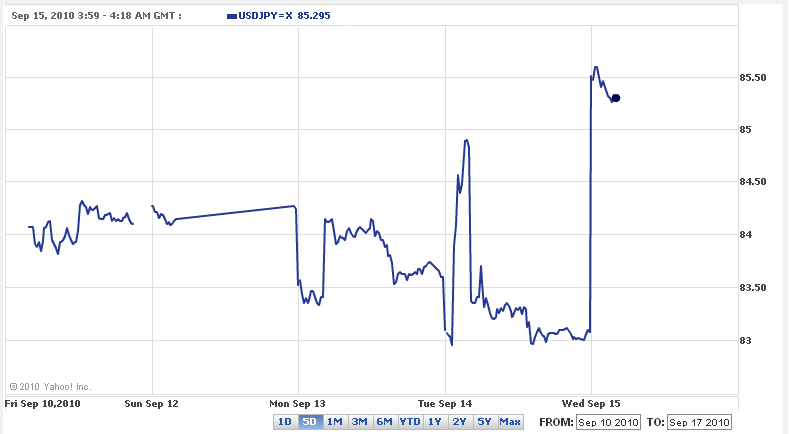September 15th 2010
Japan Finally Intervenes in Forex Markets
After months of speculation, the Bank of Japan (BOJ) has finally intervened in the currency markets. As the plummeted towards a fresh low against the Dollar, the BOJ swiftly entered the market, driving the Yen up 2% instantly. On the day, it finished 3% higher against the Dollar.
Over the last few weeks, Japan had been inching slowly towards intervention. [In fact, I was prepared to write a post yesterday about intervention being imminent, but that is neither here nor there…] The Finance Minister, Governors of the Central Bank, Members of Parliament, and even the Prime Minister himself had started to become increasingly vocal about the Yen’s un-halting rise, and the need to control it. It had already touched a 15-year high, and was only 4% away from it’s all-time low. With rhetorical intervention and its easy monetary policy failing to sway investors, the Bank of Japan sold an estimated $20 Billion worth of Yen on the open market.

By no coincidence, the intervention was carried out only one day after a Parliamentary vote to see whether Naoto Kan would be replaced as Prime Minister. Having defeated Ichiro Ozawa and survived the challenge, Kan evidently was determined to make good on his promise to rescue the economy from the brink of another downturn. (Only a few days earlier, he admitted, “We’re conducting various talks, so other countries won’t say negative things when Japan acts. We’re studying now various scenarios, examining possible responses from markets when we take a decisive measure.”)
Reaction to the intervention has been mixed. On the one hand, the fact that the BOJ waited so long before stepping in is evidence that this measure was taken out of desperation. According to Billionaire investor George Soros, “Japan was right to act to bring down the value of the yen. ‘Certainly, they are hurting because the currency is too strong so I think they are right to intervene.’ ” Politicians and policymakers, on the other hand, were not so kind. One US Senator called the move “disturbing” and Jeane-Claude Trichet, President of the ECB, said it was “not…appropriate.”
From these snippets, then, it’s clear that the intervention is being conducted unilaterally and lacks any support from other Central Banks. Thus, if the BOJ is to continue selling the Yen, it will do so alone and perhaps even under the open contempt of other Central Banks. At the same time, it appears to have some credibility with investors, who may back off the Yen for the time being. That’s because the BOJ is trying to make owning the Yen as unattractive as possible, by driving down interest rates and attempting to spur inflation. Whether investors will take the hint and stop and return to using the Yen as a funding currency for the carry trade is still unclear. (Despite unraveling significantly over the last two years, the Yen carry trade may still exceed $500 Billion). Japan also has to contend with China, which has been putting upward pressure on the Yen by buying Japanese bonds.
For that matter, it’s not even clear whether the BOJ will continue to intervene. Perhaps it just wanted to send a message to investors by showing that it can weaken the Yen any time it wants. Besides, a protracted campaign to hold down the Yen would be expensive and doomed to failure over the long-term, as the BOJ learned the hard way in 2003-2004 and has probably been reminded of by the Swiss National Bank’s recent failure to weaken the Franc. On the other hand, the BOJ needs to show investors that it is serious, and a “shock and awe” intervention campaign is probably the only real way to achieve this.
Either way, I think it’s fair to say that those who bet on the Yen do so at their own peril. While I don’t think the Yen is suddenly going to return to 100 JPY/USD, the fact that my personal reserves are not nearly as vast as those of the Bank of Japan means I’m not inclined to bet on it…



